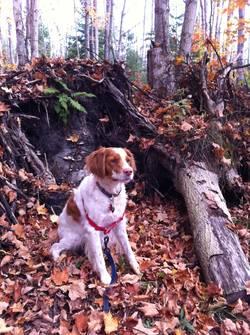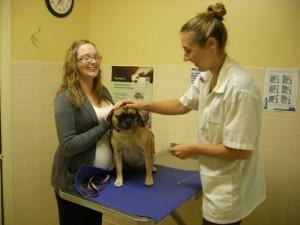
Leptospirosis is a bacterial infection caused by spiral-shaped bacteria known as leptospires. The bacteria are transmitted by the urine, blood or tissues of infected animals. Infection most frequently occurs in dogs but has the potential to occur in all animals, including humans and cats. This is why we take this infection seriously at Mitchell Veterinary Services.
The primary route of exposure is from wildlife such as rodents, raccoons or ground hogs. For this reason, hunting dogs or pets camping, cottaging or living in rural areas have a greater risk of exposure. Infected individuals may shed the bacteria into their environment for several months. It can survive in water or soil for several weeks. A domestic dog can become infected by drinking, swimming or walking through contaminated water. The leptospires enter the body through a cut, eyes, nose or mouth.
Leptospirosis may cause a range of symptoms in pets. Certain pets may be carriers and not show any symptoms but have a risk of spreading the bacteria to other individuals. Dogs often have vomiting, diarrhea, lack of appetite, excessive drinking, abdominal pain, severe weakness, fever and muscle pain. Many patients have severe liver and kidney damage that is seen on their bloodwork. Blood and urine testing can be performed by a veterinarian to determine if a pet has been exposed to leptospirosis.
Treatment is available for leptospirosis. This involves antibiotics and frequently, hospitalization on IV fluids is also necessary. Without aggressive therapy, or if not treated early, this disease may be fatal. We recommended avoiding contact with your infected pet’s urine before the pet has received treatment. If necessary, gloves and protective clothing may be worn. Due to the human health risk, we recommend informing your physician if you have  had contact with a pet’s urine, blood or tissues during its infection.
had contact with a pet’s urine, blood or tissues during its infection.
Leptospirosis is preventable through vaccination of our dogs. The vaccine is not 100% protective, since if does not provide immunity against all the different strains of the bacteria. Vaccines may reduce the severity of the disease but will not prevent infected dogs from becoming carriers. The veterinarians at Mitchell Veterinary Services recommend removing standing water and controlling wildlife in the pet’s environment. This will help reduce the risk of your pets coming into contact with the bacteria.
